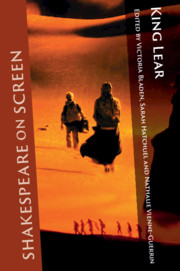Book contents
- Shakespeare on Screen: King Lear
- Series page
- Shakespeare on Screen: King Lear
- Copyright page
- Dedication
- Contents
- Illustrations
- Notes on Contributors
- Series Editors’ Preface
- Acknowledgements
- Chapter 1 Introduction: Dis-locating King Lear on Screen
- Part I Surviving Lear: Revisiting the Canon
- Part II Lear en Abyme: Metatheatre and the Screen
- Part III The Genres of Lear
- Part IV Lear on the Loose: Migrations and Appropriations of Lear
- Chapter 10 Relocating Jewish Culture in The Yiddish King Lear (1934)
- Chapter 11 The Trump Effect: Exceptionalism, Global Capitalism and the War on Women in Early Twenty-first-century Films of King Lear
- Chapter 12 Looking for Lear in The Eye of the Storm
- Chapter 13 Between Political Drama and Soap Opera: Appropriations of King Lear in US Television Series Boss and Empire
- Chapter 14 Afterword: Godard’s King Lear
- Chapter 15 King Lear on Screen: Select Film-bibliography
- Index
- References
Chapter 13 - Between Political Drama and Soap Opera: Appropriations of King Lear in US Television Series Boss and Empire
from Part IV - Lear on the Loose: Migrations and Appropriations of Lear
Published online by Cambridge University Press: 10 September 2019
- Shakespeare on Screen: King Lear
- Series page
- Shakespeare on Screen: King Lear
- Copyright page
- Dedication
- Contents
- Illustrations
- Notes on Contributors
- Series Editors’ Preface
- Acknowledgements
- Chapter 1 Introduction: Dis-locating King Lear on Screen
- Part I Surviving Lear: Revisiting the Canon
- Part II Lear en Abyme: Metatheatre and the Screen
- Part III The Genres of Lear
- Part IV Lear on the Loose: Migrations and Appropriations of Lear
- Chapter 10 Relocating Jewish Culture in The Yiddish King Lear (1934)
- Chapter 11 The Trump Effect: Exceptionalism, Global Capitalism and the War on Women in Early Twenty-first-century Films of King Lear
- Chapter 12 Looking for Lear in The Eye of the Storm
- Chapter 13 Between Political Drama and Soap Opera: Appropriations of King Lear in US Television Series Boss and Empire
- Chapter 14 Afterword: Godard’s King Lear
- Chapter 15 King Lear on Screen: Select Film-bibliography
- Index
- References
Summary
Both Boss (Starz, 2011–2012) and Empire (FOX, 2015–) were conceived as modern retellings of King Lear. Tom Kane, the corrupt mayor of Chicago in Boss, and Lucious Lyon, the African-American CEO of Empire Entertainment in Empire, both diagnosed with an incurable neurological disease at the beginning of the shows, are Lear figures who now have no option but to ‘crawl toward death’. From this premise, both Empire and Boss significantly rework the Lear character arc as well as the family pattern derived from Shakespeare’s play, not only by regendering Lear’s children in Empire or subtracting two daughters in Boss, but also by adding a wife and mother. Both shows, then, use material from King Lear in the loose way characteristic of ‘Shakespearean’ drama series such as House of Cards (Netflix, 2013–) or Game of Thrones (HBO, 2011–). This chapterexamines to what extent each show’s specific production context aesthetically and ideologically informed its appropriation of King Lear, looking at the way each series’s recycling and reconfiguring of material from King Lear contributes to its exploration of family relationships, physical and mental degradation, loyalty and betrayal, ambition and power, and interacts with issues of gender and race.
- Type
- Chapter
- Information
- Shakespeare on Screen: King Lear , pp. 202 - 218Publisher: Cambridge University PressPrint publication year: 2019

